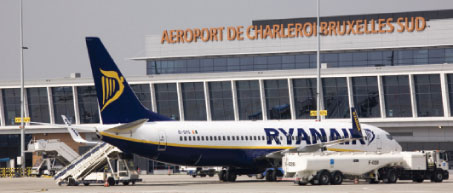
The Court of First Instance annulled the European Commission’s decision on advantages granted by the Walloon Region and Charleroi Airport to Ryanair, concluding that “the Commission’s refusal to examine together the advantages granted by the Walloon Region and by BSCA and to apply the principle of the private investor in a market economy to the measures adopted by the Walloon Region, in spite of the economic links binding those two entities”.
The case concerned two agreements, which Ryanair entered into in the mid-1990’s – one with the Walloon Region, owner of the airport, and the other with Brussels South Charleroi Airport – a public sector company, controlled by the Walloon Region, which manages and operates the airport as concession holder. The Walloon Region granted Ryanair a 50% reduction in landing charges compared with the regulatory level and undertook to compensate the airline for any loss of profit arising from subsequent changes in airport charges. Ryanair agreed in counterpart to base between two and four aircraft at Brussels South Charleroi Airport and to operate at least three rotations a day per aircraft for 15 years. The airport also agreed to collect one euro per passenger for the provision of ground handling services, rather than 10 euros collected from other users.
In 2004, the European Commission ruled that these incentives constituted state aid incompatible with the common market and ordered the Belgian government to recover around 14 million from Ryanair. Following an appeal by Ryanair against the decision last December, the European Court of First Instance concluded that “the Commission’s refusal to examine together the advantages granted by the Walloon Region and by BSCA and to apply the principle of the private investor in a market economy to the measures adopted by the Walloon Region, in spite of the economic links binding those two entities, is vitiated by an error in law”, and therefore annulled the decision.
Marcel Buelens, CEO, Brussels South Charleroi Airport, believes the consequences for other SMAG airports are positive. “As long as both parties – the airport, its shareholders and the airline – are happy with the agreement and the results, the outcome can only be considered as being positive,” he said. “In some areas of Europe funding a route with state aid can be considered as a necessity. We at Brussels South Charleroi, however, do not fund a route entirely by public aid. We use the EU’s ‘De Minimis’ system, which is clear, fair and concise.”
Economic growth
It is essential that the importance of airports as engines of economic development is recognised – they provide significant revenues to their regions and these benefits must be preserved. Ryanair CEO Michael O’Leary said: “Charleroi Airport has been the model for how small regional and secondary airports around Europe can transform themselves from unused airfields into growing profitable international airports, which are providing regional growth, new jobs, lower fares, competition and choice for millions of European consumers.” In 1997 – Ryanair’s first year of operation at the airport – traffic reached 200,000 passengers. Last year, total passenger traffic at the airport increased 20% year-on-year, to almost 3 million passengers.
Cooperation between airports and their regions is increasing, with many looking to new air services to boost economic growth. The European Court of First Instance ruling in the Ryanair/Charleroi case recognises a wider application of compliance with private investor principles and with European legislation. “The Commission decided that it will not appeal the decision of the Court of First Instance (CFI). We will now study the matter further and the Commission will issue a new decision implementing the Court’s decision,” said a spokesman for European Commission Vice-President Antonio Tajani when asked about its response to the CFI ruling. It remains to be seen how the scheduled revision of the European Commission’s own guidelines in this regard, will reflect this latest development.







